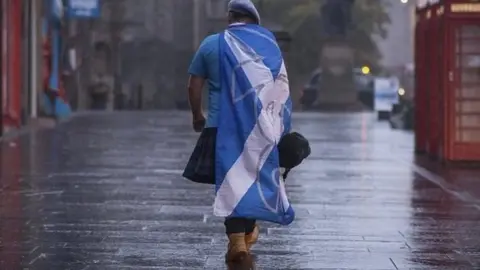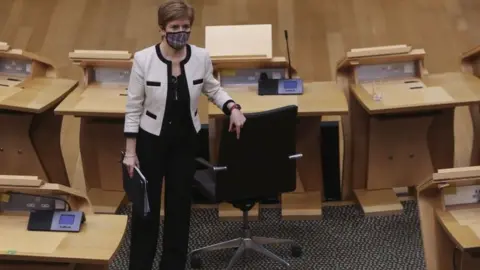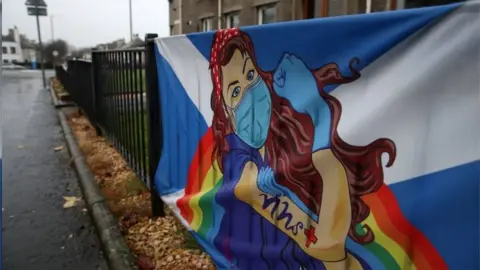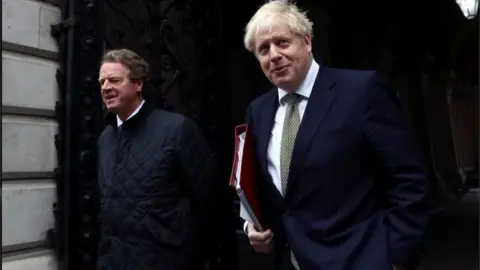What's going on with Scottish independence?
 PA Media
PA MediaScottish independence is back in the headlines and will be a key issue at this weekend's SNP conference.
A number of recent polls have suggested rising support - and many unionists are worried.
The issue is set to be central in the Scottish Parliament elections in May.
Bring me up to date: What's happened before?
Scotland held a vote on independence in 2014 - when 55% rejected leaving the UK.
But anyone thinking the referendum would settle the issue was wrong - it has continued to be the dominant question in Scottish politics in recent years.
The issue was thrust back into the limelight again in 2016 when the UK voted to leave the EU.
Although the UK-wide vote was 52% to 48% in favour of Brexit, the result was very different in Scotland, where it was 62% to 38% in favour of remain.
The day after the referendum, Nicola Sturgeon said the situation was a "democratic outrage" and that another independence vote was "highly likely". Her goal was to maintain Scotland's place in the EU.
But that didn't happen and Scotland left the EU at the same time as the rest of the UK.
Although the Scottish Parliament voted for the power to hold indyref2 in March 2017 (Holyrood currently has a pro-independence majority when the Scottish Greens are factored in), Prime Minister Theresa May said that "now is not the time".
The SNP government in Edinburgh wanted to agree the process with London like it had done in 2014 and there was a bit of a stalemate until the snap general election in 2017.
The SNP lost 21 seats.
Ms Sturgeon parked her plans.
Independence is going to be a big issue in 2021
The SNP will call for the power to hold another referendum in their manifesto for the Holyrood election in May - and polls suggest they are on course to win comfortably.
Even if they don't have a majority, the pro-independence Greens might get them over the line again. Nicola Sturgeon will then be able to call the prime minister and say she has a mandate.
A series of polls published since August have put the 'Yes' side ahead.
We had seen the odd poll before suggesting the pro-independence side in the lead, but this is the first time there has been a run of polling evidence suggesting it.
Some in the UK government expect the trend to continue - though they think some of the support is "soft" and many could have their minds changed.
Senior SNP figures argue independence is now the "settled will" of Scottish voters.
 PA Media
PA MediaThere's also the pandemic.
Health is devolved - so the Scottish Government has been making most of the big decisions on how to respond. That means the devolved government is more important than ever in people's lives - literally making life or death decisions.
Nicola Sturgeon has been the face of Scotland's response, hosting near daily press conferences since March.
There is evidence Scots believe Ms Sturgeon has handled the crisis well - and that Boris Johnson hasn't.
A BBC Scotland poll suggests 74% of Scots believed Nicola Sturgeon had done a good job, while just 19% thought the same about the prime minister. Those surveyed were not uncritical of decisions made by the Scottish Government, but seemed to be happier they were making them than the government in London.
 PA Media
PA MediaMany unionists I've spoken to agree that leadership is one of the key factors driving support for independence. The Scottish Conservative leader Douglas Ross has cast doubt on whether he sees the PM as an asset for unionists - he even said Ms Sturgeon was a better communicator than Mr Johnson.
Is a second Scottish independence referendum going to happen?
This is the million-dollar question in Scottish politics.
The SNP still want a process agreed with Westminster so that if Scotland voted for independence, it would be seen as legitimate.
But the UK government shows no sign it will agree to another referendum.
They say the referendum was supposed to be "once in a generation" and that everyone should be focussed on other issue just now. Some in the government have talked about waiting another 20 years before changing their mind - although privately others fear that position isn't sustainable.
If the SNP win the election next May, they plan to put pressure on the prime minister by arguing the Scottish electorate has elected a party committed to holding another referendum.
 PA Media
PA MediaIt would anti-democratic, the argument goes, for a government in London to ignore that.
But some in the SNP are restless and want Nicola Sturgeon to have a Plan B - a strategy to hold another referendum even if London says no.
Suggestions include a legal challenge to explore whether indyref2 can happen without the PM's approval and just passing legislation to hold one and seeing if Number 10 launches a legal challenge itself.
But there isn't a campaign yet….
This is important - and something those who oppose independence mention in conversations a lot.
If there were to be another referendum, they would ask big questions about how an independent Scotland would work.
Would the economy be sustainable? What would the impact on trade with the rest of the UK be? What currency would an independent Scotland ultimately use?
The campaign would also allow the pro-independence side to talk up all the things it believes are positives. It's also worth remembering that support for independence rose in the run up to the 2014 vote - in 2012 very few polls showed support of a third. The pro-independence side will be hoping that can persuade more people during any campaign.
There's no guarantee there will be another referendum.
But it's a safe bet the issue will be discussed a lot in the coming months.
